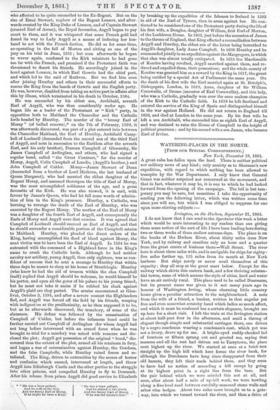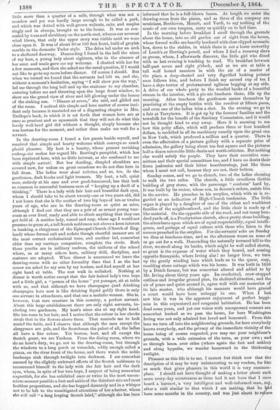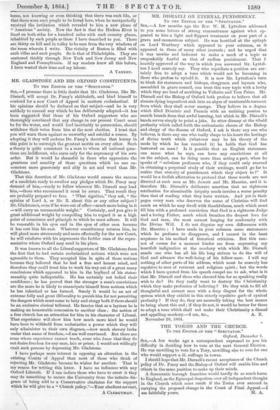New York, November 19, 1864.
A great calm has fallen upon the land. There is neither political nor military news of any kind ; only anxiety as to Sherman's new expedition, with regard to which nothing has been allowed to transpire by the War Department. I only know that General Grant was neither surprised nor concerned at the movement, and that in fact, whatever it may be, it is one to which he had looked forward from the opening of the campaign. The lull is but tem- porary you may be sure, but meantime I take the opportunity of sending you the following letter, which was written some time since you will see, but which I was obliged to suppress for one upon more stirring subjects :— Irvington, on the Hudson, September 21, 1864.
I do not know that 1 can send to the Spectator this week a letter which would be more interesting to my readers than one giving them some notion of the sort of life I have been leading here during two or three weeks of these mellow autumn days. The place is on the banks of the Hudson River, about thirty miles from New York, and by railway and omnibus only an hour and a quarter from the great centre of business there—Wall Street. The river here is about three miles wide, and is navigable for ships for eighty- five miles farther up, 115 miles from its mouth at New York harbour. But ships rarely or never avail themselves of this capacity; they all stop at the great mart below. Except for the railway which skirts this eastern bank, and a few thriving substan- tial towns, some of which assume the style of cities, land and water have an air entirely rural. This place used to be called Dearmans, but its present name was given to it not many years ago in honour of Washington Irving, whose charming little country house gives a peculiar attraction to the neighbourhood. A note from the wife of a friend, a banker, written in that angular yet free and even somewhat scratchy hand which ladies so much affect, and which it must be confessed has a certain elegance, brought me up here for a short visit. I left the train at the Irvington station at about half-past four in the afternoon, and amid a throng of elegant though simple and substantial carriages there, one driven by a negro coachman wearing a coachman's coat, which yet was not a livery, drove up for me. A bright-eyed ruddy-cheeked lad of fourteen or fifteen sprang out and greeted me, saying that mamma and all the rest had driven out to Tarrytown, the place next highest up the river. We started at once at a brisk trot straight up the high hill which here forms the river bank, for although the Dutchmen have long since disappeared from their old haunts, they left their roads behind them, and they seem to have had no notion of ascending a hill except by going at its highest point in a right line from the base. But the pair behind which we were minded this not at all, and soon, after about half a mile of up-hill work, we were bowling along a fine level road between carefully-masoned stone walls and arbor vitas hedges. About two miles more brought us to a gate- way, into which we turned toward the river, and then a drive of servant. dollars, is modelled in all its machinery exactly upon the great one In the drawing-room I found a few guests beside myself, and in New York, which produced a million and a quarter. There is received that simple and hearty welcome which conveys so much even the affectation of a picture gallery with a separate price of placid pleasure. My host is a beauty, whose present ravishing admission, the gallery being about ten feet square and the pictures embonpoint makes her regard Mr. Banting's pamphlet, which has half-a -dozen miserable little daubs not worth criticism. But nothing been reprinted here, with no little interest, as she confessed to me else would satisfy the people. They have their executive corn- with simple naivete'. But her dazzling, dimpled shoulders are mittees and their special committees too, and f have no doubt their covered now, for unless on great occasions we do not dine here in fierce jealousies and their bitter heartburning,s, just like those full dress. The ladies wear demi toilettes, and so, too, do the whom I must not call, because they are not, their betters.
gentlemen, dark frocks and light trousers. My host, a tall, quiet Sunday comes, and we go to church, two of the ladies choosing man, entirely at his ease and ever good-humoured, has that look to walk the two miles. The church, a little cruciform Gothic so common to successful business-men of "keeping up a devil of a building of grey stone, with the parsonage "conform" hard by. thinking." There is a lady with fair hair and beautiful dark eyes, It was built by its rector, whose son, in deacon's orders, assists him whom I should take to be about twenty-one or two years old, did in the service. He preaches in his surplice, which with us is re- I not learn that she is the mother of two big boys of ten or twelve garded as an indication of High-Church tendencies. The little years of age, who are in the drawing-room as quiet as mice, organ is played by a daughter of one of the oldest and wealthiest although I find out that they are a pair of as arrant young tear- families of the neighbourhood, and the little choir is made up of coats as ever lived, ready and able to climb anything that they can like material. On the opposite side of the road, and not many bun- get hold of. A maiden lady, round and rosy, whose age I would not dred yards off, is a Presbyterian church, also a pretty stone building, presume to guess at, a tall Scotch nobleman not above a keen interest the attendants upon which are of equal respectability, equal intelli- in banking, a clergyman of the Episcopal Church (Church of Bug- gence, and perhaps of equal culture with those who listen to the land) whose formal snit and sedate though cheerful manner are of sermon preached in the surplice. For the servants' sake on Sunday the most correct ecclesiastical tone, and another lad, somewhat we dine at luncheon-time, and as the afternoon wears on some of older than my carriage companion, complete the circle. Both us go out for a walk. Descending the naturally terraced hill to the these youths are in military undress, the uniform of the school river, we stroll along its banks, which might be well called shores, where, as at many others here, military drill, discipline, and so great is the expanse of water which they bound, and coining costume are adopted. When dinner is announced we leave the opposite Sunnyside, where Irving alas ! no longer lives, we turn drawing-room with no other formality than that I as the last up the gently winding lane which leads us to the queer, cosy, corner am asked for my arm by my hostess, and find myself at her rambling stone cottage which was his home. It was built in 1650 right hand at table. The rest walk in uuliuked. Nothing at by a Dutch farmer, but was somewhat altered and added to by dinner is worth notice except that the fair-haired lady's two boys Mr. Irving about thirty years ago. Its crocketted, crow-stepped and a little girl, a "person of the house" yet younger, sit at table outlines and irregular ground plan, its sheltered situation, and the with us, and that although we have champagne (and drinking air of peace and quiet around it, agree well with our memories of champagne here now is like drinking liquid gold) there is only its late master, who although his manners would have graced one servant in attendance, and that one a mulatto woman. She is, a court would have been unhappy in one. When I last however, that rare creature in this country, a perfect servant. saw him it was in the apparent enjoyment of perfect happi- About this large establishment there are only eight servants, in- ness in this sequestered and congenial habitatiod. He has been
eluding two gardeners. My host's niece sits at my right hand, dead some years, and yet our voices with unexpressed consent are She has roses in her hair, and I notice that the colour in her cheeks somewhat hushed as we pass the house, for here Washington rivals that in the flowers above them. That reminds me to look Irving was not only admired but loved and honoured. From this round' the table, and I observe that although the men except the lane we turn off into the neighbouring grounds, for here everybody clergyman are pale, and the Scotchman the palest of all, the ladies knows everybody, and the privacy of the immediate vicinity of the all have a fine colour. Yet hostess, host, and all except the house being of course respected, you may use your neighbour's
Scotch guest, we are Yankees. From the dining room, where we grounds, with a wide extension of the term, as your own ; and do an hour's duty, we go, not to the drawing-room, but through so through lanes, over stiles (where again the feet and ankles) the windows to a long porch or verandah, oddly enough called a and along bypaths, we wander homeward in the thickening piazza, on the river front of the house, and there watch the noble
landscape sink through twilight into darkness. I am somewhat twilight.
amused by the slightly awkward efforts of the Scotch nobleman to recommend himself to the lady with the fair hair and the dark eyes, whom, in spite of her two boys, I suspect of being somewhat coquettish, for she has exhibited once or twice in the most uncon
scious manner possible a foot and ankle of the daintiest size and most mere every-day occurrences as these had it not been that I once faultless proportions, and she has begged demurely and in a whisper heard a baronet, a very intelligent and well-informed man, say, not to be left to the unmitigated attentions of her admirer, whom after a visit similar to that which I am making, that he lid ahe will call "a lane bottling Scotch laird," although she has been been some months in the country, and was just about to rjurn little more than a qua-tier of a mile, through what was not a informed that he is a full-blown baron. At length we enter the meadow and yet was hardly large enough to be called a park, drawing-room from the piazza, and as three of the company are and which was dotted with well-grown walnuts, oaks, and maples musicians, Beethoven, Mozart, and Verdi, to say nothing of the singly and in clumps, brought us to the house. It was so con- music of our own tongues, carry us quickly on to bed time.
cealed by trees and shrubbery on the north-east, whence our severest In the morning before breakfast I stroll through the grounds wind blows, that only the upper story was visible until we were about the house, into an old garden out of sight from the house, close upon it. It was of about 80 or 100 feet front, built of greyish whose formal walks are heavily bordered with close clipped aromatic marble in the domestic Tudor style. The drive led under an arch box, down to the stables, in which there is not a horse unworthy to a sheltered doorway. Descending I found in the hall the niece of Leech's or Herring's pencil, and where I find a runaway slave
of my host, a young lady about eighteen, who in the absence of as groom, whom, I afterwards discover, the little girl who dined
her aunt and uncle gave me my welcome. I chatted with her for with us last evening is teaching to read. We breakfast between a few momenta, and then she asked me the usual question, if I would half-past seven and eight p'clock, and as we are at table a
not like to go to my room before dinner. Of course I should. But tall wolf hound saunters in with the air of a master of when we turned we found that the servants had left us, and she, the place, a deep-chested and very dignified looking pointer without a moment's heiitation, saying " I will show you the way," soon follows him, and before I finish my second cup of tea I led me through the long hall and up the staircase to my chamber, have a skye terrier of preternatural ugliness begging at my side. entering before me and throwing open the large front window, to A drive of our whole party to the wooded banks of a beautiful show me the grand view of river and bill glowing under the beams stream in the interior, with a plc-nic luncheon there, fills up the of the sinking sun. " Dinner at seven," she said, and glided out morning. After luncheon the gentlemen amuse themselves by of the room. I noticed this simple and here matter of course inci- practising at the empty bottles with the revolver at fifteen paces, dent only because it reminded me of a disgusting chapter in Mrs. and even one of the ladies tries a shot. In the evening we go to Trollope's book, in which it is set forth that women here are at a fair at Tarrytown. It is got up by the farmers' families and the once so prurient and so squeamish that they will not do what this townfolk for the benefit of the Sanitary Commission, and it would lovely well-bred girl did without a thought, simply because she not be thought kind to stay away. Here it is amusing to see was hostess for the moment, and rather than make me wait for a how this petty affair, which will produce three or four hundred
Pleasant as this life is to me, I cannot but think now that the description of it may be very uninteresting to my readers, for like so much that gives pleasure in this world it is very common- _ place. I should not have thought of making a letter about such home, not knowing or even thinkink that there was such life, or that there were such people to be found here, when he unexpectedly received the invitation which revealed to him a new phase of " American " society. Now the fact is that the Hudson River is lined on both sides for a hundred miles with such country places, inhabited by such people as those I have described to you. There are thirty on hill and in valley to be seen from the very windows of the'room wherein I write. The vicinity of Boston is filled with such villas and such people. So is that of Philadelphia. They are scattered thickly through New York and New Jersey and New England and Pennsylvania. If my readers knew all this before, I have wasted their time and my labour.
A YANKEE.
































 Previous page
Previous page